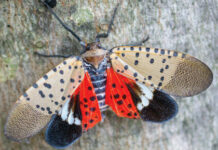A single mosquito can produce 400 offspring in four days, according to Orkin. And they can also carry diseases right into your client’s backyard, like West Nile and Zika.
Read more: Is it Time to Add Zika to Your Mosquito-Control Messaging?
With strong, natural smells, these fragrant plants can help diminish the scent of humans that mosquitoes are attracted to. Keeping plants close to the home and patio where people will be will help keep mosquitoes at a distance. Crushing the plant leaves to release their perfume and then rubbing the leaves on skin can also help, according to Rodale’s Organic Life.
These plant suggestions can help dissuade mosquitoes, and some other insects, from invading your client’s yard:
1. Citronella grass and lemon grass
The most commonly thought-of plant for repelling mosquitoes, the oil from this lemon-scented grass is found in bug sprays as well as candles, torches and mosquito coils to produce a scented smoke. Citronella can be planted in the ground or in large containers (for relocating to avoid frost) with full sun and good drainage. Side note: Be aware of citrosum, another perennial that smells similar to Citronella but is not as effective.
2. Marigolds
Marigolds have a distinct smell from the pyrethrum they contain. The bright, orange flowers can be started from seed or nursery plant and placed in pots near doorways or on decks. Bonus: The marigold scent also repels squash bugs and tomato worms that threaten your client’s garden.
3. Catmint and catnip
These perennial’s oils have been shown to be more effective than DEET. From the mint family, the plant can become invasive, so be wary about placement in your client’s landscape. It contains a chemical called nepetalactone, which is also a feline attractant.
4. Lavender
Although the scent repels mosquitoes and other flying insects, lavender will be most effective for your client if the oil is rubbed on skin. It does well is warm climates and can be tough and drought-resistant in affected areas. Dried lavender can also be put in closets and wardrobes to deter moths.
5. Herbs: Peppermint, basil, rosemary, sage and lemon balm
Peppermint — An added bonus to the scent and mosquito repellent, rubbing fresh peppermint on a mosquito bite can offer relief.
Lemon balm — While keeping mosquitoes away, this lemon-smelling plant attracts pollinators. Also known as horsemint, lemon balm is a member of the mint family and can be invasive since it is fast growing, drought resistant and reseeds itself. Consider planting for clients in a container for control.
Basil — A 2009 study showed that the essential oil from basil is actually toxic to mosquito larvae. Lemon basil and cinnamon basil are the best varieties to prevent unwanted pests.
Sage and rosemary — Burning sage or rosemary in your client’s fire pit will produce an incense in the smoke that will help deter mosquitoes.
What plants do you use in your region to deter mosquitoes and other insects?




























![[VIDEO] Dickies®: Discover Workwear That’s Anything But Uniform](https://turfmagazine.kinsta.cloud/wp-content/uploads/2023/06/1647663814-4b1a2a7742790a9b1e97a3b963477850192e1d6a9dfba9b07214a77bae25d6e3-d-324x160.jpg)


